
Notice: This work was carried out at University of South Wales, Digital Forensics Laboratory, Pontypridd, United Kingdom (Sep 2015)
Forensics Analysis of Xbox One Game Console
Ali M. Al-Haj
School of Computing
University of Portsmouth
United Kingdom
Abstract
Games console devices have been designed to be an entertainment system. However, the 8th generation games console
have new features that can support criminal activities and investigators need to be aware of them. This paper highlights
the forensics value of the Microsoft game console Xbox One, the latest version of their Xbox series. The Xbox One
game console provides many features including web browsing, social networking, and chat functionality. From a
forensic perspective, all those features will be a place of interest in forensic examinations. However, the available
published literature focused on examining the physical hard drive artefacts, which are encrypted and cannot provide
deep analysis of the user’s usage of the console. In this paper, we carried out an investigation of the Xbox One games
console by using two approaches: a physical investigation of the hard drive to identify the valuable file timestamp
information and logical examination via the graphical user interface. Furthermore, this paper identifies potential
valuable forensic data sources within the Xbox One and provides best practices guidance for collecting data in a
forensically sound manner.
Keywords: Xbox One, Embedded System, Live Investigation, Games Console, Digital Forensics
Introduction
Video game consoles have become a significant part of
many peoples’ lives. As these devices evolve, it is clear
that there is a requirement for digital forensics
investigators to identify what they are capable of
offering and how it can be examined. It is no secret that
these devices challenge investigators in many ways
because such security features involve encrypted data.
These challenges should not stop investigators.
Research is required into how to deal with these devices
in an efficient way. The 8th generation of game consoles
devices requires connection to the Internet to take
advantage of the devices’ features. People use games
consoles not only to play games but for browsing the
web, sharing videos, watching TV and communicating
with others – among many other features these devices
can offer. The capability of these devices makes it more
capable than just playing games. The Xbox One is the
‘all in one entertainment system’ as Microsoft likes to
define it (Xbox, 2015). Xbox One was released with two
versions; the first one with a 500 GB hard drive in
November 2013 and the second one with a 1TB hard
drive in the fall of 2015. Moreover, this device has been
designed to be a multimedia device, like a PC, Microsoft
has made the Xbox One more capable to the end user
and, therefore, more valuable for the digital forensics
investigator, compared to other game consoles. Every
game played, every web page visited and every message
sent can leave digital traces on the user’s device or
profile. Currently, no one can deny the fact that game
console forensic analysis has become such an important
and independent part of digital forensic investigations.
There are over 13 million Xbox One game consoles in
worldwide circulation (Orland, 2015). However, little
literary guidance is available offering forensic
investigators an insight into what information of interest
is stored on the Xbox One, or how to gain information
from a forensics perspective. This research aims to
provide a best practical guidance to investigate the Xbox
One games console that can help investigators deal with
such a system. Furthermore, it demonstrates two
approaches; a physical investigation into the hard drive,
to identify valuable file timestamp information,
furthering the work conducted by Moore et al. (2014),
and a logical investigation via the graphical user
interface (GUI).
The structure of this paper is arranged as follows.
Section 2 covers the literature related to the analysis
conducted on other 8
th
generation games consoles and
also identify similar forensics challenges, Section 3
describes the initial study conducted which is used to
design the experiment methodology, Section 4
describes the experiment methodology, Section 5
states the forensic analysis of the Xbox One, Section
6 describes the additional tests that have been
conducted, Section 7 presents the proposed guidance
for examination of the Xbox One, and, finally,
Section 8 highlights conclusions, and future work.
Background
There are two published work on Xbox One forensics,
first one was done by (Moore et al., 2014) their research
provided the initial analysis of the device and its hard
drive. However, in their study they used the traditional
experimental methods in digital forensics investigation
(Davies et al., 2015) such as file carving, keyword
searches, network forensics and file system analysis.
According to (Moore et al., 2014) the greatest challenge
seems to be the encrypted and/or compressed nature of
the hard drive and the network traffic, therefore causing
extraction and analysis slightly difficult. However, an
analysis of the NTFS file system during this controlled
experiment enabled them to retrieve file timestamps. In
their findings they stand on some hypotheses for some
files functionality these need to be tested. Moreover,
they did a live investigation on some encrypted network
traffic that could be related back to which game was
played. The Xbox One uses a standard file system
(NTFS) which provides files timestamp examination
unlike PS4, which has a totally encrypted hard drive
(Davies et al., 2015). However, according to (Moore et
al., 2014) the encrypted and/or compressed nature of the
file system, make it hard to provide an in-depth analysis
of the Xbox One operating system artefacts. The second
research was done by (Shields, 2014 ) the research
focused on the encrypted hard drive artefacts, the
researcher has focused on examining the NTFS file
timestamp modification during the experiment and
notified the new files created after each test. However,
(Moore et al., 2014) were able to identify the installed
games and applications from the User contact partition
on the hard drive by identifying the unique 36 characters
that related to each game also the in the user partition
has the same size of the game or application. Though
(Shields, 2014) provided a larger list of the available
applications on the Xbox live store with its unique
characters that helps the investigator to identify the
installed games and applications from the hard drive
image.
Sony PlayStation 4
The analysis conducted by (Davies et al., 2015) which
is also the only published work about the PlayStation
4 forensics they provided the best practical
methodology to examine the PlayStation 4 artefacts.
Moreover, they developed a special experiment
methodology to extract the information from the
device after they faced the non-standard file system
in the encrypted PlayStation 4 hard drive (Davies et
al., 2015). They had no choice but the logical route to
investigate the device artefacts. Their study was
based on empirical research to identify the features of
interest for forensics investigators. The researchers
have considered the online and offline investigations
by using the Voom Shadow 3 write blocker.
Furthermore, the amount of obtainable data from the
PlayStation is directly dependent on the operating
system version installed on the console (Davies et al.,
2015).
The Forensic Challenges
The Xbox One uses standard file system (NTFS) that
allows file's timestamp examination. However, these
timestamp analysis may help investigator to
determine if one incident happened on the device or
not, such as identifying if there is an installed
application on the system or not, it could tell the
investigator when was the last shutdown of the device
(Moore et al., 2014) but it can never provide a deep
investigation to the system artefacts where the
information itself is unavailable. However, we cannot
ignore the standard NTFS timestamp that is available
for us on the hard drive that may provide significant
evidence in some cases but it cannot offer the full
image. We identified a number of forensics
challenges that stood in the way of Xbox One
examination in the previous studies. These challenges
were shared by Xbox One with most modern
embedded system. It starts with the encrypted nature
of the hard drive, also the need of the internet
contention where most of the user data is stored in the
cloud, and finally the data modification through
several platforms such as the Smartglass applications.
The Association of Chief Police Officers (ACPO)
Consideration
Electronic evidence is valuable evidence, and it should
be treated in the same manner as traditional forensic
evidence with respect and care (Association of Chief
Police Officers, 2012). For that, any data extraction
methodology presented should be taken into account
according of the criteria and standards adopted. This
research was carried out in the United Kingdom, and all
the examination on the Xbox One implemented with
sufficient respect to the current best practice of evidence
acquisition provided by Association of Chief Police
Officers (ACPO).
The Initial Study
The unique Xbox One system specification as we
discussed previously in the literature review section, and
the empirical research nature, requires initial study and
tests. This stage aims to determine the best experiment
methodology to meet the digital forensics community
needs and aspirations. The initial study started by
examining the available literature on Xbox One and
others devices such as PlayStation4 and Xbox 360 game
consoles to identify the features that the investigators

were looking for examining these devices. Furthermore,
an empirical investigation through the Xbox One screen
menu has been done to navigate the features that can
provide evidence of user usage and communication
during an examination process.
In this stage, the focus of the investigation was on the
features that can provide answers to the digital forensics
investigators questions that related to the user identity,
the type of information hold time and location. The
Xbox One is designed to hold up to 32 account profiles
stored on the console according to Xbox Support (2015)
these accounts responsible for creating any evidence and
can identify the user interaction. Data is generated from
many features of the device, the timestamp data created
in the hard drive file system or live via the Xbox GUI
shows when the data was generated. Finally, the Xbox
One system stores the user’s data locally on the device
in the internal or external storage and the cloud.
See Table 1
The Initial hard drive test:
The internal Xbox One hard disk was designed by
Microsoft to be unchangeable. However, some
people succeed to replace the internal hard drive by
cloning the original hard disk system partition into a
new hard drive using tools box on the UNIX platform
with the dd utility. In turn the Xbox system was
successfully booted without any issues and without
affecting the NAND memory.
Live Investigation Verifying Methods
Write Blockers Tests
In game console devices, examiners apply write
blockers technology to do the live investigation on the
games console (Davies et al., 2015) by connecting the
write blockers between the game console hard drive and
its host device as a man in the middle. However, we tried
two write blockers devices on the Xbox One game
console to determine our path in the research and to
meet our basic forensic integrity.
The Voom Shadow 3
The Voom Shadow 3 is a caching hardware write
blocker intended to allow a safe, active examination of
a system to take place. However, we tried to use it with
Xbox One game console to do the live investigation
through it, but all ours attempts fail to run the console
effectively. Moreover, the researcher has contact the
Voom Technology company, and they stated that they
have never tried the device with Xbox One and cannot
confirm that its work. (See Figure 1)
.
Tableau T3458is Forensics Bridge
The Tableau T3458is Forensics Bridge offers write
blocker functionality to the source drive. However, we
tested with Xbox One game console as a man in the
middle between the Xbox One and its hard drive (See
Figure 2).The device was stuck at the initial green
screen which cussed because the Xbox one trying to
write into the hard drive .
Feature
Reason
Xbox Live
Entertainment
Network
Most features available to Xbox One users are
reliant upon an Xbox live network membership.
The device cannot be accessible without an Xbox
live membership. However, Xbox One allows the
user to add Gusts offline accounts after adding a
primary account on the console.
The membership enables users to view Xbox live
content through a PC web browser, Xbox app on
Windows 8, 8.1,10 and smartphones through
Xbox One Smartglass app. These accesses will
reveal the user's real name, address, credit or debit
card information, transaction history, linked
devices and sub-account information.
The Internet
Explorer
browser
Internet Explorer on Xbox One offers full web
browsing feature for Xbox users. However, The
Internet browser does not support office
documents contain Recent tabs, Bing search
history and favourites pages with numbers of
featured pages such as Twitter and Facebook.
Media sharing
Apps (Upload
,Upload Studio,
GmaeDVR,
OneDrive,
Twitch )
The Upload enables players to share, via social
media, content recorded by the Xbox One Kinect
camera, gameplay video, and screenshots. Also,
Upload Studio allow users possess the ability to
edit screenshots and to record voiceovers and
video cover for video commentary.
GameDVR the place where the user finds his
gameplay recorded videos and screenshots.
Players can upload their videos to OneDrive and
broadcasting themselves via Twitch.
Messages, Voice
messages , Party
chat
Messages between individuals and multiple users.
Xbox parties allow users to group up and chat with
friends through Xbox One up to eight friends
Skype App
Enables users to video chat and voice chat with
each other while playing games and using apps.
Skype communication history.
Activity Feed
Recently user’s usage of the device and their friends
list including recent gameplay, recent achievements,
recent new additions to their friends list.
Notifications
bar,
Activity Alert
Xbox One console notify users of an events, such
as when receiving a new message or have an
incoming Skype call. Notification history cannot be
deleted, and notifications stay in the notification
bar for a week or until there are more than 50
(Xbox, 2015).Activity Alert such as added friends
and liked posts.
Friends list
User’s friends and the link on Skype and Twitter.
Also, the Real name can be visible depend on the
user’s privacy setting, meaning that a user's real
name can display in all communications.
Xbox Storage
Provides system storage information such as disk
usage, application saved data, games and apps list
and available disk space.
User profile and
billing
information.
Personal data/ Gamertag generated by the user.
Table 1 Features of interest for digital forensics investigators
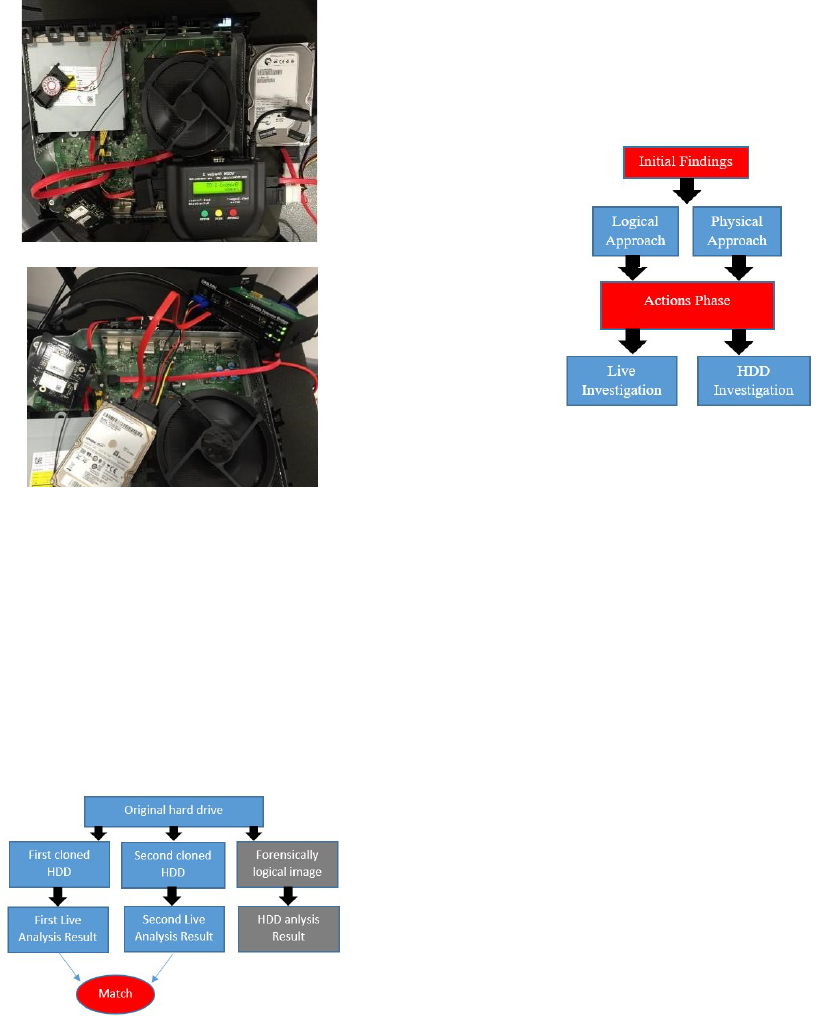
Figure 1 Voom Shadow 3 connected to Xbox One
Figure 2 Tableau T3458is Forensics Bridge connected to Xbox One
Proposed Logical Investigation Verifying Method
Based on our initial findings, and the failing of the
tested write blockers technology to work with Xbox
One, the best practical way to do live investigation is
to forensically clone the original hard drive into new
hard drive and lets the cloned image host the
examination process. Furthermore, our proposed
method keep the original hard drive without
modification (ACPO, 2012) (Figure 3) shows the
proposed live investigation verifying result method
Figure 3 live investigation verifying method
Experiment Methodology
The proposed methodology for the examination of the
Xbox is divided into two analysis approaches: physical
and logical, which came after the initial findings
presented earlier. Furthermore, the Action phase takes
place when the sample of the dataset is introduced into
the system via controlled users accounts created for the
purpose of examination. Figure 4 shows the process of
the experiment. This experiment methodology was
developed by studying the features empirically of the
interest of forensics examiners that were identified
earlier in Table 1.
Figure 4 the Experiment process
The Physical approach
The physical approach aims to identify the hard drive
partitions and the timestamp for the existing NTFS files
on it and after introducing the set of data. Moreover, it
contains some small tests to identify valuable evidence
which is provided by the hard drive from the NTFS files
timestamp. However, the physical analysis takes into
account the previous preliminary forensic analysis of
the device that has been done by Moore et al. (2014) to
avoid repetition and to build on their findings.
The Logical Approach
According to Moore et al. (2014) research findings and
the nature of the encrypted hard drive makes the
physical analysis ineffective route to provide a deep
analysis of the Xbox One system artefacts. Furthermore,
the logical analysis route was the primary focus of this
research that aims to investigate the Xbox One system
via the native Xbox One interface. In addition to that,
According to Sutherland et al. (2014) this that route is
also the most useful available way to investigate the
modern embedded devices.
The Experiment Methodology Performed on the
Device was as followed:
1. Running video capture camera, recorded time and date
to ensure all the examination activities on the system
are registered when reference propose is needed.
2. Configured the Xbox One system that needs online
access. Recording time and date on the console system
to make sure it is compatible with real-time by
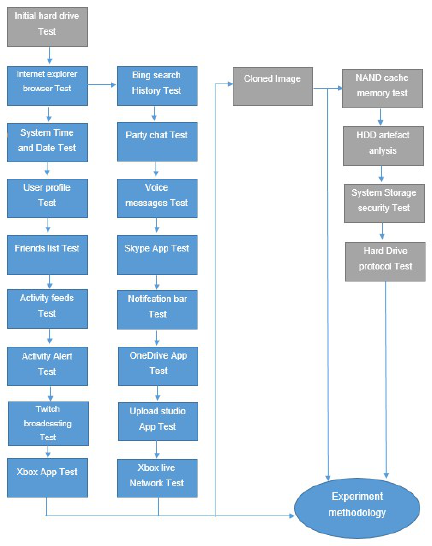
configuring the right time zone. The device is not
accessible to use without this stage.
3. Forensically imaged the Xbox One hard drive for the
timestamp offset examination. We used FTK Imager
3.2.2 to create the forensic images.
4. Turned on the Xbox One and recorded the time as set
on the console system to note any differences between
the real time and the time on the console system. The
differences should apply to any data that
Can be retrieved from Xbox One to ensure that the
right time is recorded.
5. Started the Actions phase. Input the Scenarios of
Usage. (data inputs)
6. Powered off the Xbox One. Seized the video capture
camera and recorded the time. The video capture
provides evidence of all data inputs and any changes
to the system during this repetition for the set of
scenarios.
7. Again, Forensically imaged Xbox One hard drive for
the physical analysis stage
8. Forensically cloned the original hard drive image into
a new hard drive and left it for validation proposes.
9. Connected the new clone hard disk to the device.
10. Powered on Xbox one investigation areas in (Table 1)
to identify activations left by users from the Actions
Phase during the experiment loops.
11. Forensically cloned the original hard drive into
another hard drive again for validation proposes.
12. Powered on Xbox One investigation areas in (Table 1)
to compare with the result from stage number 10.
13. Compared the retrieved data in stages 10, 12, with the
input data in the action phase. Recorded information,
timestamps and any other evidences indicated by using
the device.
The Actions Phase:
1. Creating numbers of accounts which are necessary to
access Xbox One game console features. Xbox One
cannot be used by local accounts. Creating a main
Xbox live account on the console device.
2. A Subscription in the Gold Xbox Live membership for
an account, to ensure that all the features are available
such as party chat. The other users with free
membership in Xbox live. However, Microsoft gives
all users’ permission to access the console system with
gold membership to use the features, over 32 users.
3. Adding numbers of contacts and followers to assess
the message and other social device functions.
4. Create Skype account to use later for examination.
Also adding Skype users to that account to see if they
appeared elsewhere on the console.
5. Installing two games (FIFA 2015, Battlefield 4)
playing games with different mode (online, offline)
and also with single player and multiplayer. However,
all the features do not work in the offline playing mode
unless the Game DVR recorder.
6. Using a screenshot, Game DVR, Skype calls during
play times.
7. Editing recorded video with Kinect camera using
Upload Studio application and upload videos to
OneDrive.
8. Browsing the internet via Internet Explorer to test
recent tabs, pervert tabs, featured tabs and Bing search
history.
9. Creating Twitch account and use the live broadcasting
feature to see what kind of evidences it can leave.
Forensic Analysis of Xbox One
Figure 5 shows a series of different tests that were
conducted to consider the ability of a forensic
investigator to identify usage of Xbox One. The
Action phase was introduced to three operating
system versions 6.2.13194.0, 6.2.13326.0 and
6.2.13332. Any notable changes between revisions
are discussed below.
Figure 5 Empirical examination of the Xbox One
The Logical Analysis
Time and Date Test
We conducted a system-wide analysis of the Microsoft
Xbox One, focusing on the retrieval of date and
timestamp information. It was discovered that the
majority of the features, such as Activity Feed, Activity
Alert, etc., provided the data. In contrast, applications
such as the Internet Explorer browser did not present
any form of a date or time information for the recent
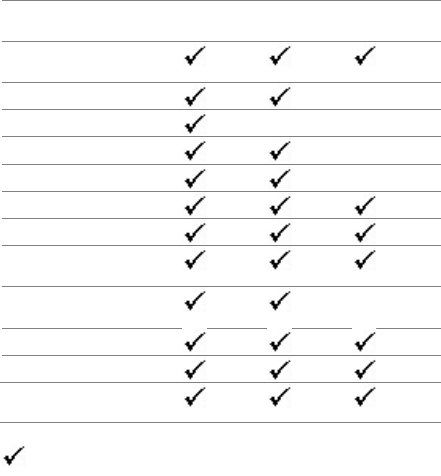
tabs. However, Bing search history presents the date,
while the Messages features introduced the date and
time upon which messages were sent and received.
Skype, provided time and date for all retrievable data,
OneDrive does not present any data or time for
uploaded items.
Internet Explorer Browser, Favourites Pages, Bing
Search History
A number of tests were carried out on the Xbox One
Internet Explorer browser, the experiment involved
visiting 106 website. After the consultation with the
Xbox support team about the limitation for the recent
tabs that are stored in the browser history. However, all
the visited web pages has have been recorded in the
recent taps tabs. Bing search history also appears in
the browser, as the browser records without logging into
the users account in Bing. The Analysis of the web
browser history, favourite pages and featured pages,
concluded that the time and date upon visited pages are
not available. On the other hand, Bing search history
proved date of the search and whether the user has
looked for videos, images or general web searches.
Another experiment carried out on the browser to
determine if the user leaves the browser by using the
Home button on the Xbox One controller without
closing the tab/s whether it will recover the session or
not. During the experiment loop, we discovered that the
last session would stay in the browser even if the user
logouts from the Xbox One and comes back again.
Moreover, this covers the normal browsing and the
inPrivate browsing. Furthermore, we tested two default
featured pages in the browser, Facebook and Twitter to
see whether the browser saves the credential login data
or not. However, if the user chooses to save them, they
will be retrievable.
Online Live Results Analysis
The online investigation on the Xbox One game
console was carried out on this research to examine
the ability of retrieving valuable information from the
system that has been identified earlier in Table 1.
However, after several experiments on the three OS
versions, we successfully extracted the majority of
the data that was identified as a target at the beginning
of this research. Unlike PlayStation 4 during our
experiment. The firmware version does not affect the
amount of the retrievable data from Xbox One.
However, the amount of obtainable information is
directly attached to the time of the incident and when
the investigation process takes place.
Table 2 demonstrates that for each feature. Table 3
shows the features and types of possible data that
could be found.
Offline Live Results Analysis
Limited data has been retrieved from the system in the
offline mode. However, from the login menu examiner
can identify the user/s has been logged in the device
with their firs name and Gamertags, general
notification from the notification bar, the game and
application available , storage usage and the saved
game data. After login. Examiner can browse the
gameplay videos recorded in the system.
Data
Up to 7
days
Up to 30
days
After 30
days
Internet Explorer
browser
Messages
X
Notifications bar
X
X
Activity Feed
X
Activity Alert
X
Friends
Xbox One Storage
Upload Studio
(saved video )
Upload Studio
(unsaved video)
X
User profile
Skype
Table 2 Xbox One artefact volatility.
The Physical Analysis
Users Gameplay videos
Forensically, these recorded game play videos may
not have much value for itself as they only show in
game footage. However, the user has the ability of
voiceover, pictures or live cam by using the Upload
Studio application that allows the contact to be
modified. Moreover, Upload Studio allows users to
record clips up to 30 minutes with text editing, voice
cover, live cam and footage. Moreover, most of the
published crimes are related to Xbox One that have a
relation to Kinect camera which can record videos,
take pictures and record voices. We examined all
these features, when the user records game play clips
OneDrive
=
Retrievable
X
=
Not Retrievable
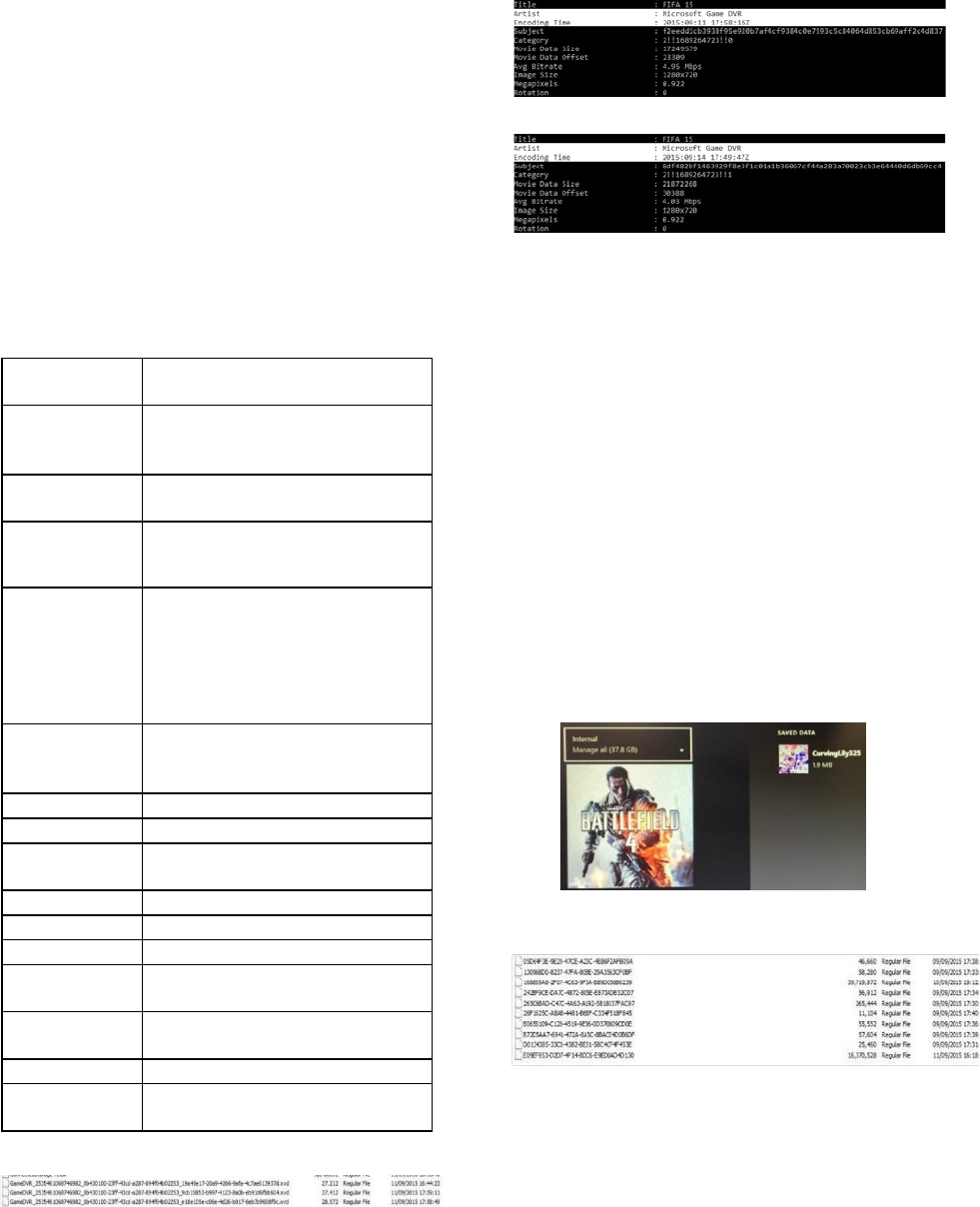
or take screenshots. The system stores directly on the
hard drive and encrypts it with the .xvd Microsoft file
format. Figure 6 shows three recorded videos we
recorded while playing FIFA 2015 and the timestamp
of these videos. However, we examined to download
these videos used by the Xbox App in Windows 10
and we were able to retrieve the Exit data for these
files. Figure 7 shows the encoding time for the video.
Moreover, we modified one video that used Upload
Studio with voice cover and live cam in 14 /9/2015
17:49 UTC and after downloading the edited video
we retrieved the Exit data shown in Figure 8.These
findings may help investigators to identify the data
and time of the edited videos.
Xbox One’s
artefacts
Types of evidences retrievable
The Internet
Explorer
browser
Bing search history, Recent tabs,
Website saved passwords, last
session, InPrivate last session
Messages
Text messages, Voice messages,
sharing videos and screenshots
Notification
bar
Installed items, Party chat invitation,
recorded videos, recorded
screenshots
Activity Feed
wall
Posts, commands, Broadcasting time
and duration, edited clips, recorded
clips, screenshots, how many times
games played, adding friends, friends
list, friends items, followers items,
last played game
Login Menu
User/s has been signed in on the
device with their Gamertags and first
name
Activity Alert
Added friends, liked items
Friends
Friends, flowers, favourite
Xbox One
storage
Games and Apps installed, storage
space, user’s game data.
Upload
My captures (All user videos )
User Profile
User first and last name, Gamertags
System
Xbox name
Billing
information
Payable Account, Credit cards,
billing address
Subscription
Type of membership expired date for
gold membership
Skype
Calls history, messages, contacts
OneDrive
Edited videos, screenshots, external
media
Table 3 Features and types of possible data could be found in it.
Figure 6 Recorded videos located on Temp Partition
Figure 7 Exif data for the third recorded videos in Figure 6
Figure 8 Exif data for the second video in Figure 6 after editing
Installed Games and Apps Timestamp
We carried out several tests on the games and
application timestamp. Moreover, we found that the
usage of these games and apps does not affect the
modified time on the games and apps at the hard drive
in the user partition. This contradicts with (Moore et
al., 2014) hypothesised that its show the last time the
game was played, and it contain the user playing
saved data. We played Battlefield 4 in the offline
mode to reach achievement, and the timestamp does
not affect by our playing. Moreover, the live offline
analysis shows that each player has separately saved
data on the hard drive see Figure 9. However, the file
timestamp changed when the game was updated and
the same for apps. See Figure 10. Table 4 shows the
most valuable Applications unique hexadecimal
names and size that will help investigators to identify
these applications from the hard drive image.
Figure 9 Batlefild4 Saved data with the Gamertag from the live
investigation
Figure 10 Games and Apps located in the User partition
Last Session duration
During the repetition of the experiments, we noted
that the .xvi files situated on the system support
partition that got the same 32 name for the
applications and game modified each time the device
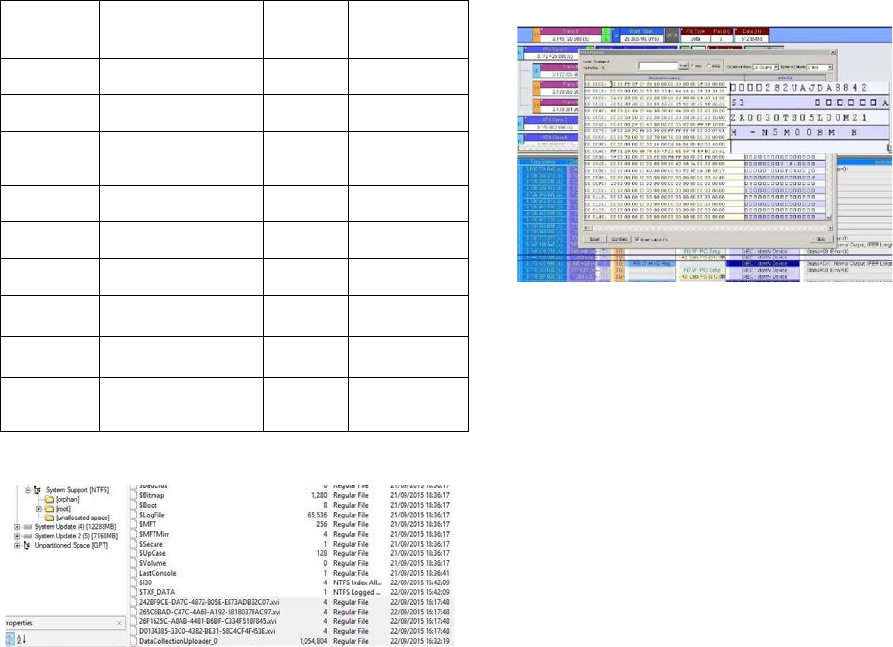
start. Furthermore, it has been known from (Moore et
al., 2014) finding and our observation that the
DataCollictionUpdater_0 located in the same
partition modified each time the system shut down.
To collect last session duration of device we identified
the final shutdown of the system and the last run of it.
However, the user should have installed at least one
application or game before last session to be able to
identify the previous session duration. Figure 11
shows that the last session duration was on our system
15 minutes long.
App Name
hexadecimal name in
User contacts
partition
Original
size
*Compressed
size
Skype
242BF9CE-DA7C-4872-
805E-E873ADB32C07
54.9 MB
56,912 MB
OneDrive
26F1625C-A8A5-4481-
B6BF-C334F518F845
10.8 MB
11,104 MB
Upload
Studio
265C6BAD-C47C-
4A63-
A1925818037FAC97
259.2 MB
265,444 MB
Vine
1333BF8D-5D7E-41BB-
B508 13BCDFF25F43
24.8 MB
25,460 MB
YouTube
13096BD0-8237-47FA-
80BE-29A3563CF0BF
56.9 MB
58,280 MB
Twitch
D0134385-33C0-4382-
BE31-58C4CF4F453E
24.1 MB
25,460 MB
Movies &
TV
B0655109-C128-4519-
9E36-0D370809CD0E
48.2 MB
55,552 MB
Media
Player
05D64F3E-9E29-47CE-
A23C-1E86F2AFB09A
45.5 MB
46,660 MB
Netflix
FB4C8FF5-ED19-
48FEA462-
851A076663C0
58.2 MB
59,660 MB
Table 4 Applications name in User content partition
*Applications size with encrypted and/or compressed data
Figure 11 System Support Partition
Additional Tests
Kinect Facial Recognition Login
One of the precious points that (Davies et al., 2015)
mentioned in their future considerations for the
PlayStation 4 that to test how smart the Kinect Facial
recognition in the games console. Moreover, we
carried out a several experiment on the Xbox One
Kinect to fool the camera using big banner, toy hands
and eyes move. However, all our attempts failed,
which show how this Kinect sensitive and powerful,
this finding may use to prove account ownership on a
multi-user system if an individual was able to unlock
a particular account available on the login menu.
Protocol Analyser Test
We employed the SATA Sierra M6-1 SATA protocol
system to test the traffic between the hard drive and
the Xbox One device. However, all the traffic
between the device and its hard desk seemed to be
encrypted. However, extract some plain text was
viewed the hard disk serial number and model. (See
Figure 12)
Figure 12 Hard drive S/N as displayed on the SATA Sierra M6-1
SATA protocol system
System Storage Security
We carried out a number of tests on the Xbox One
internal hard drive, and we found that it accept
modification in the system partition, from forensics
perspective that mean it could be used to hide data.
However, we stored Alternate Data Streams (ADS)
and bootable Virtual Machine (VM) on the hard drive
in the five Xbox One system partitions, and the
system booted up normally. We noticed that if you
store any data on the user partition, it will appear
during the live investigation in the storage.
Moreover, the user partition size in the Xbox game
console, 365 GB in the first version of the Xbox One
that released with 500GB hard drive and 780.8 GB in
the new version that released with 1TB hard drive.
Proposed best practice guidance for forensics
investigation of Xbox One game console:
The
Operating System Version
In Xbox One, the Operating system version should
match on the hard drive and the NAND memory.
Moreover, Xbox One should not force the Examiner
to update the operating system if it is on the manually
update mode. We recommend the examiner to
identify the operating system version on the device
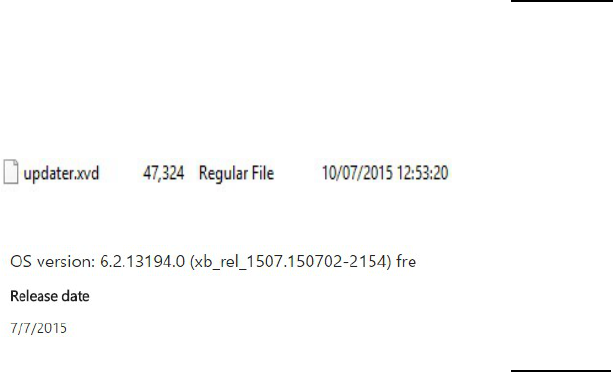
before start the online investigation. He can do that,
from the hard drive image by the date of the last
update from the update partition on the hard disk and
using the Microsoft OS versions released date list on
their website. The version installed on the system in
Figure 6 is 6.2.13194.0 released in 7/7/2015 (see
figure 2)
Figure 12 Updater.xvd from System Update partition last update
Figure 13 OS Version and release data (Xbox, 2015)
However, if an investigator faces a forced update
should not update the system and keep the
investigation offline on the suspect device.
Moreover, we suggest that if the Xbox One live login
credential available live investigation could take
place on another Xbox One console and all the data
will be available unless installed games and the
notification bar data. Though, the online
investigation can also take a place on Xbox One
Application in Windows 10 using the User login
credential that offer some of the data identified in
Table 3. We suggest that police have to seize the
suspect personal PC and personal smartphone to
surround the suspect activities around the case.
However, If the Xbox One live login credential is
available, we tested that changing the suspect
account’s password cannot prevent the suspect to
modify some data if he already logged into his
account from one of the Xbox applications its doesn't
log him out. In this guidance stages ordered from the
volatile to the less volatile. It is important to start
with right examination approach analysts should
determine what type of data they are looking for
based on their cases and using Table 2 and 3.
Live/Active Investigation:
1. Remove and forensically image the Xbox One Hard
Drive.
2. Forensically clone the Xbox One hard drive into new
hard drive.
3. Connect the new cloned hard drive into Xbox One.
Offline Mode
4. Active the video capture device and record real time and
date.
5. Turn on Xbox One and check time and date on the system
to apply any offset on the data retrieved at the end.
6. Navigate to the My Game & App menu identify installed
games and Apps.
7. Identify the user/s first name/s and their Gamertags form
login menu.
8. Login to user account would allow you to see the user’s
recorded clips and screenshots (from games not edited
videos) if the user was recorded in the same system
during playing.
9. Check the notifications bar.
10. Disable the Automatic update if it is enabled from the
system setting and record that change if you make it.
Online Mode
11. Take the system online and start navigation the evidence
as follow:
a. Check the Notifications bar again.
b. Activity Feed list
c. Activity Alert
d. Messages
e. User Information
f. Check Twitter account if the user has registered on the
console setting screen.
g. Internet Browser History: the examiner should be
aware that when navigating the Bing search history he
will create a new visited page in recently visited pages
list. It should record it to avoid changing on the
suspect evidence. However, he could use the InPrivate
browser to prevent that. Check the featured pages
(Facebook, Twitter, MSN) provide it by Internet
Explorer in the browser it may contain login
credentials information could help you with your case.
h. Upload Studio/ My captures
i. Skype
j. OneDrive: we recommend if the user's login
credentials available to test the OneDrive on the web
that provide you the uploaded items timestamp.
k. Friends list
12. Turn off Xbox One
13. Turn off capture video record
14. You could clone the original hard drive again into new
hard drive and repeat the live investigation for
verification purpose.
Physical investigation HDD:
1. Back to the hard disk image you have taken on the being
start your physical analyses to gather NTFS files
timestamp data and to check the system partitions for any
strange files. It is up to the examiner to decide using any
advanced forensics investigation tools such as FTK and
Encase which has carving functionality that could help if
the internal hard drive has modified with external data.

2. Identify when the last session of the Xbox One was user
should have installed at less one app to be able to identify
the previous session.(See Figure 10)
3. Identify valuable installed application/s on the system
from the temp contacts partition using table 3. (See
Figure 9)
4. Identify user-recorded videos in playing from the temp
contact partition which .(See Figure 6)
5. Identify how many connected controllers has been used
in the device from the system partition. (See Figure 11)
6. Determine, when the first usage of the device from
the system update partition. System volume
information folder timestamp.
Conclusion
The proposed best practice guidance would let digital
forensics examiner perform a logical analysis of a write
protected Xbox one. Moreover, the physical analysis
allows them to gain the valuable NTFS file timestamp
from Xbox one hard drive. The modification of
information is prevented on the original evidence
source, and thus evidential integrity is maintained. The
amount of data retrievable however is directly
dependent on the incident time and when the
investigation takes a place. Table 2 determines that. The
live offline analysis provided a little amount of data
such as the user's first name, recorded gameplay videos
and storage state. However, the live online analysis
provides the majority of the user data. Table 3 details
the features, and the possible data the investigator could
find there. The forced operating system update could
interrupt the examiner investigation if the credential
login were unavailable. However, it is the best practical
guidance to examine the device. The Additional tests
provided some useful finding for investigators about the
Xbox One hard drive also it is aware them that Xbox
One hard drive can be used in steganography cases.
Future Work
The advanced technology that keeps on developing
for users and the interactivity options for the Xbox
One that may require investigation in their right.
Newly, Microsoft allows Xbox one users to stream
their Xbox One games to a Windows 10 PC or tablet,
this connection would be interesting to examine.
Future research should consider the implication of
the Xbox One connection capabilities with the
SmartGlass App on smartphones and tablets. Any
evidence of the user usage and communications will
be a place of interest to investigators.
Acknowledgements
The author would like to thank the Information
Security Research Group (ISRG) at the University of
South Wales for the various supports given in
completing this work. Special thanks go to Gareth
Davies, Konstantinos Xynos and Huw Read.
References
Association of Chief Police Officers (2012) ACPO good
practice guide for digital evidence. 2012. Official release
version, The Crown Prosecution Service. Available at:
http://www.cps.gov.uk/legal/assets/uploads/files/ACPO_gui
delines _computer_evidence[1].pdf.
Davies, M., Read, H., Xynos, K., & Sutherland, I. (2015).
Forensic analysis of a Sony PlayStation 4: A first
look. Digital Investigation, 12, S81-S89.
Express & Star (2015) Gamer blackmailed girl, 12, for sex
images. Available at:
http://www.expressandstar.com/news/2015/09/17/gamerblac
kmailed-girl-12-for-sex-images/ (Accessed: 1 October
2015).
Moore, J., Baggili, I., Marrington, A., & Rodrigues, A.
(2014). Preliminary forensic analysis of the Xbox
One. Digital Investigation, 11, S57-S65.
Orland, K. (2015) Sony PS4 now owns the majority of
currentgeneration console sales. Available at:
http://arstechnica.co.uk/gaming/2015/07/analysis-sony-
pushespast-50-percent-of-the-worldwide-console-market/
(Accessed: 28 September 2015).
Shields, N. (2014) ‘Exploratory Analysis of the Microsoft
Xbox one’, F3 Analyst’s Annual Workshop, 14.
Sutherland, I., Read, H., & Xynos, K. (2014). Forensic
analysis of smart TV: A current issue and call to arms. Digital
Investigation, 11(3), 175-178.
Xbox One |Official Site Available at:
http://www.xbox.com/enUS/xbox-one?xr=shellnav
(Accessed: 5 October 2015).
Xbox One Operating System Versions and System Updates
(2015) Available at: http://support.xbox.com/en-GB/xbox-
one/system/system-updateoperating-system (Accessed: 4
October 2015).
Xbox support, T. (2015) Xbox One. Available at:
http://support.xbox.com/en-US/browse/xbox-one/apps
(Accessed: 15 September 2015).
